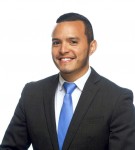A University of California Board of Regents committee nominated Paul Monge to be the student regent for the 2017-2018 academic year. Monge, a UC Berkeley law student, spoke with the Daily Bruin’s Ryan Leou to discuss what motivated him to become student regent and how he plans to address student issues. The board will vote whether to approve Monge as student regent at its July meeting at UC San Francisco.
Daily Bruin: How did your experiences prepare you to be student regent?
Paul Monge: I’m the first in my family to receive a higher education, and I’m the eldest sibling to seven brothers and sisters. I felt personally invested to make sure the UC is able to honor its commitment to remain accessible and affordable to California residents, so my siblings and students like them are able to pursue the educational opportunities that I’ve been afforded.
I (served) as the student body president my senior year at UC Santa Barbara as an undergraduate, where I was heavily involved in advocacy work with the Board of Regents. In Sacramento, (I worked) with the state legislature and governor (to explain why) the UC needs to be funded as a public institution.
DB: How do you plan to address issues like housing affordability and food insecurity?
PM: I think (affordability) should go beyond the context of tuition. It should also apply to the quality of life students experience. We should include affordable housing and transit opportunities in these discussions, and look at students comprehensively as part of the UC system. Our lives as students are not the only thing that matters, but also our lives as tenants and commuters.
UC campuses are located in some of the most expensive municipalities – not just in the state, but in the country. What doesn’t happen enough is intentional partnership between UC campuses and the cities and local governments where they’re located. (UC campuses could pursue) bond measures to free up public revenue for housing construction on campuses, rent control ordinances and tenant protection provisions.
DB: How do you plan to improve the UC administration’s response to alleged sexual assault?
PM: We need to make the (sexual harassment) reporting process survivor-centered by providing more resources while people are pursuing the process of filing a complaint or waiting to hear a response. Some students mentioned in conversation the need (to notify) students when faculty or staff are found in violation of sexual harassment policy.
Title IX offices are also understaffed, resulting in tremendous amount of backlog, and inhibiting the office’s ability to address issues in an appropriate amount of time. I will try to push for additional funding from the state to increase staff capacity in Title IX offices. To the extent possible, I plan to insert myself in some of those conversations (from UC President Janet Napolitano’s sexual assault task force) and make sure these needs and concerns are being represented.
DB: How can the UC provide better mental health services to its students?
PM: Students, especially from underrepresented communities like students of color or lesbian, gay, bisexual and transgender students, have said they experienced a lack of diversity in counseling staff. Students have particular needs and experiences that would be supported if they had a more diverse counseling staff that is more reflective of them and the student body.
A lot of what the role (of student regent) requires is being able to elevate the issues that may not be obvious to the regents or central administration. Regents operate in a lot of higher education landscapes with a lot of stakeholders – not just regents and the UC Office of the President, but also the state legislature. We need to communicate the importance of such issues to all involved parties.
DB: What are your thoughts on several incidents at UCLA, including the “Kanye Western”-themed fraternity party, in which (minority communities) have felt threatened?
PM: These themed parties and decimation of students of color have been around as long (as the UC). We have some tools to address these issues, including the UC regents’ Principles Against Intolerance, but it’s really a cultural issue – the way we communicate our commitment to diversity, and maintain a climate where people feel respected and dignified. We have to challenge different prejudices, from (all members of the UC community).
